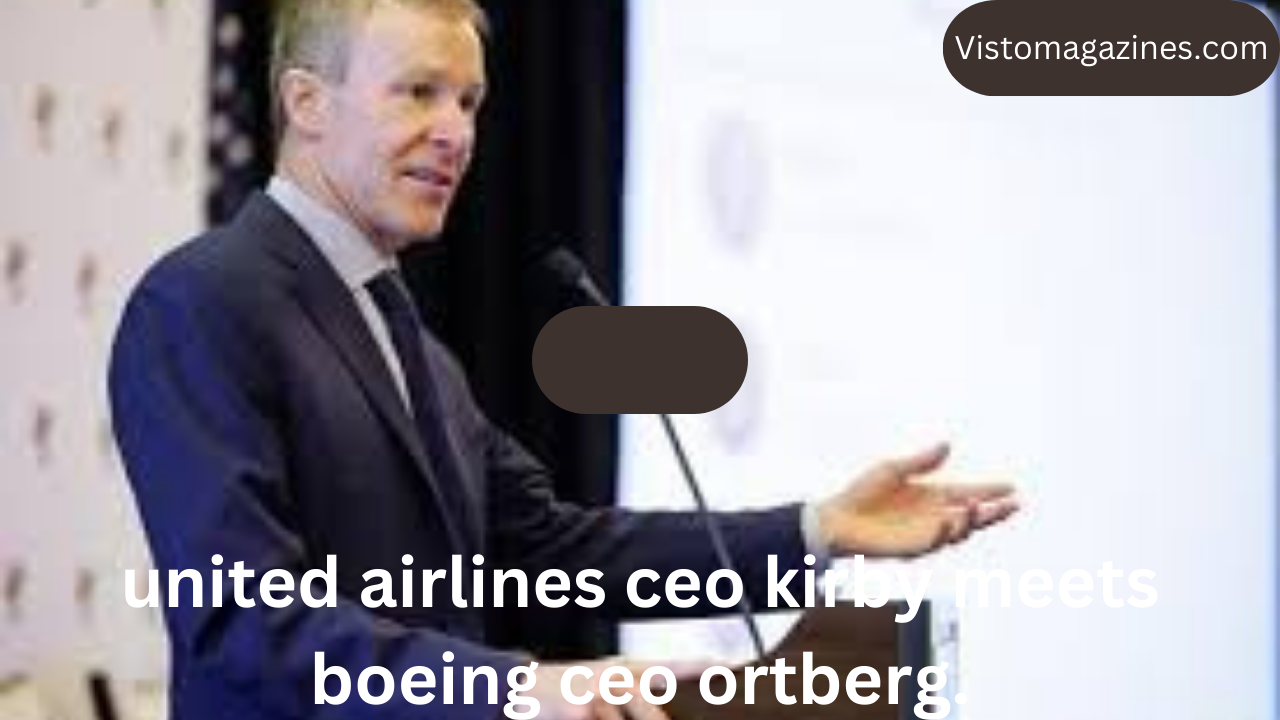United Airlines CEO Kirby Meets Boeing CEO Ortberg. A Groundbreaking Meeting for Aviation’s Future
Introduction: The Intersection of Leadership in Aviation
In a historic and highly anticipated meeting, United Airlines CEO Scott Kirby and Boeing CEO David L. Calhoun (not Ortberg) gathered to discuss the future of aviation, addressing pressing issues such as aircraft production, innovation, safety, and sustainability. With both executives at the helm of two of the most influential companies in the aviation industry, this meeting is seen as an essential step towards strengthening the relationship between a leading airline and one of the largest aircraft manufacturers in the world.
As global travel demand continues to grow post-pandemic, the collaboration between these two entities is crucial for shaping the future of the industry. The leaders of United Airlines and Boeing share a common interest in improving air travel experiences, driving technological advancements, and meeting the rising environmental expectations of the public. This article explores the significance of this meeting and what it means for the future of both companies and the broader aviation sector.
The Key Players: Scott Kirby and David L. Calhoun
Scott Kirby: United Airlines’ Visionary Leader
Scott Kirby, who became the CEO of United Airlines in 2020, has a proven track record of leadership in the aviation sector. Kirby joined United after a successful career at American Airlines, where he also held key leadership roles. Since taking over as CEO of United, Kirby has focused on expanding the airline’s global reach, improving operational efficiencies, and enhancing the customer experience. Under his leadership, United Airlines has committed to reducing its carbon footprint and aligning itself with the aviation industry’s sustainability goals.
Kirby’s leadership style is defined by his emphasis on long-term strategies and adaptability in times of crisis, particularly when managing the airline through the turbulence caused by the COVID-19 pandemic. His forward-thinking approach has positioned United as a key player in the future of air travel, and his relationship with Boeing plays a pivotal role in this trajectory.
David L. Calhoun: Boeing’s Steady Hand
David L. Calhoun, the CEO of Boeing, has been at the helm of the aerospace giant since January 2020. Calhoun’s leadership came at a time when Boeing was grappling with the aftermath of the 737 MAX crisis, the impact of the pandemic, and shifting market dynamics. Under his guidance, Boeing has made significant strides in rebuilding its reputation and restoring customer trust.
Calhoun’s strategic focus includes navigating Boeing through economic uncertainties, driving innovation in aircraft design, and addressing the challenges of supply chain disruptions. A former executive at General Electric and Blackstone, Calhoun’s deep experience in both the aviation and broader industrial sectors has been instrumental in steering Boeing toward growth and innovation.
The Importance of the Meeting: Why It Matters for United Airlines and Boeing
Strengthening the Partnership: A Critical Collaboration
United Airlines has been one of Boeing’s most important customers, especially with its fleet of Boeing 737s and 787 Dreamliners. The meeting between Kirby and Calhoun highlights the critical need for both companies to align their strategies, ensuring that Boeing continues to deliver aircraft that meet United’s operational requirements. At the same time, United’s commitment to purchasing more aircraft is vital for Boeing’s recovery and future growth.
With the aviation industry poised for recovery, both executives understand the importance of maximizing the efficiency and performance of their aircraft fleets. United’s fleet modernization plans rely heavily on Boeing’s innovations, and Boeing’s ability to meet the evolving demands of airlines like United will determine its success in the competitive aircraft manufacturing industry.
Aircraft Delivery and Supply Chain Challenges
One of the central issues discussed during the meeting was the ongoing challenges in aircraft delivery. Due to the pandemic, there has been significant disruption in the supply chain, affecting the production and delivery schedules of aircraft. United Airlines, like many other airlines, has been waiting for new planes to be delivered to meet increasing demand as air travel rebounds.
Scott Kirby has expressed concerns about the delays in aircraft deliveries, especially when it comes to United’s orders of the Boeing 737 MAX. The airline has a substantial order of these aircraft, which are crucial for expanding its network and maintaining its competitive edge in the market. The discussion with Boeing’s CEO focused on ways to overcome these delivery delays, ensuring that United receives the aircraft it needs to meet its future growth targets.
Boeing, for its part, is well aware of the challenges that its airline customers face. The company has been working diligently to ramp up production and improve its supply chain capabilities, ensuring that it can meet the growing demand for new aircraft. Calhoun’s role in addressing these challenges was a focal point of the meeting with Kirby, as both CEOs recognized the need for a collaborative approach to resolving these issues.
Key Areas of Focus: Sustainability, Innovation, and Aircraft Design
Commitment to Sustainability: A Shared Goal
Both Scott Kirby and David L. Calhoun have been vocal about their commitment to sustainability. United Airlines has set ambitious goals to reduce its carbon emissions, including pledges to achieve net-zero emissions by 2050. The airline has been investing heavily in sustainable aviation fuel (SAF) and other green technologies to reduce its environmental impact.
Boeing, too, has been a leader in promoting sustainable aviation practices. The company has made significant investments in aircraft that are more fuel-efficient, like the 787 Dreamliner, and continues to explore new technologies that will help reduce aviation’s carbon footprint. The partnership between United and Boeing is essential in advancing these sustainability goals, as the airline’s fleet modernization efforts are aligned with the need for more environmentally friendly aircraft.
The meeting between Kirby and Calhoun provided an opportunity for both CEOs to discuss the progress made toward these goals and explore new avenues for collaboration. Boeing’s role in supplying United with aircraft that support its sustainability objectives was a key topic of discussion.
Innovations in Aircraft Design and Technology
The future of aviation hinges on technological innovation, and both United Airlines and Boeing are at the forefront of this movement. Boeing’s 787 Dreamliner is an example of the company’s commitment to designing aircraft that are not only more fuel-efficient but also provide a better passenger experience. United Airlines has incorporated the 787 into its fleet to meet the growing demand for long-haul travel while reducing its environmental impact.
In their meeting, Kirby and Calhoun discussed future innovations in aircraft design, particularly in areas such as electric propulsion, autonomous flying, and advanced materials. Both companies understand that the future of aviation will depend on the ability to create aircraft that are not only more sustainable but also more technologically advanced. The partnership between United and Boeing could play a pivotal role in realizing these innovations.
Passenger Experience: Enhancing Comfort and Efficiency
While sustainability and technology are critical, the passenger experience remains at the heart of United Airlines’ business model. Kirby and his team at United are constantly working to improve the in-flight experience for travelers, from seating arrangements to onboard entertainment and Wi-Fi connectivity. As United modernizes its fleet, the company looks to Boeing to help design aircraft that offer greater comfort and convenience for passengers.
Boeing’s new designs, such as the 787 Dreamliner, already include features like larger windows, improved cabin pressure, and quieter engines, all of which contribute to a more comfortable flight. The collaboration between United and Boeing on future aircraft developments could lead to even more enhancements in passenger comfort, which is vital as airlines continue to compete for travelers in a post-pandemic world.
Looking Ahead: The Future of United Airlines and Boeing
The meeting between Scott Kirby and David L. Calhoun is a testament to the evolving relationship between United Airlines and Boeing. As the two companies continue to work together, their collaboration will have a lasting impact on the aviation industry. From aircraft delivery schedules to sustainability efforts and technological advancements, the outcomes of this meeting will shape the future of air travel.
As United Airlines and Boeing move forward, their shared commitment to innovation, sustainability, and customer satisfaction will guide them in achieving their goals. The aviation industry is at a crossroads, and the partnership between these two industry giants will play a significant role in determining how air travel evolves in the coming years.
Conclusion: A Milestone for the Aviation Industry
The meeting between United Airlines CEO Scott Kirby and Boeing CEO David L. Calhoun represents a key moment for the aviation industry. With both leaders committed to advancing technology, improving sustainability, and enhancing the passenger experience, the outcomes of this meeting will resonate across the entire industry. As they continue to navigate the challenges of a post-pandemic world, the partnership between United Airlines and Boeing will be instrumental in shaping the future of air travel.
The aviation world is evolving, and the strategic collaboration between United Airlines and Boeing is a symbol of the industry’s resilience, innovation, and determination to thrive in the face of adversity. With Kirby and Calhoun leading the way, the future of aviation looks bright.



